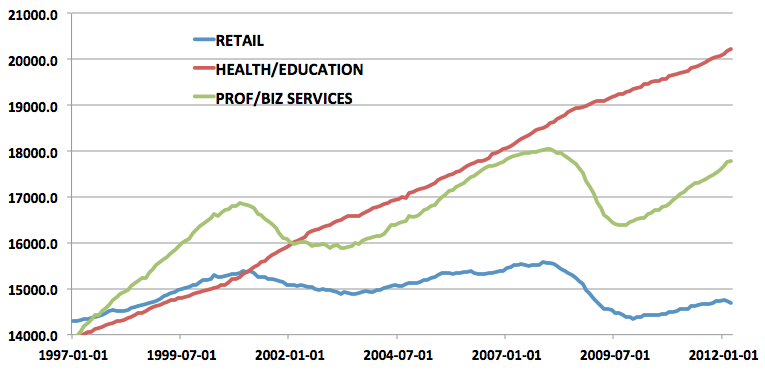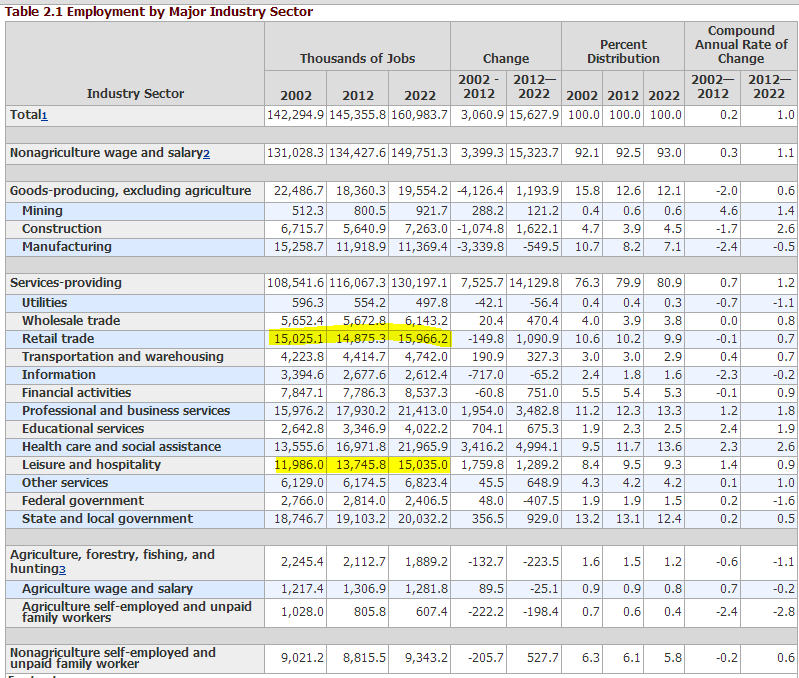The death of retail: What do RadioShack and J.C. Penney say about the future consumer economy? Low wage retail work to take a hit.
- 3 Comment
RadioShack recently announced that it will be closing 1,100 of its 5,000 stores. Holiday sales were dismal and shares were pummeled dropping by 24 percent. The problem of course is that these 1,100 store closures will result in many Americans out of jobs in one of the biggest employment sectors in the country, retail. Yet this one company is indicative of a much larger trend in consumer buying. People are choosing to opt to buy from other avenues especially online via big giants like Amazon. However you do not need a large workforce when you have incredibly efficient supply chains as Amazon has in place. This will only create a greater divide on inequality in our nation since blue collar work has been gutted and even low wage labor is taking a hit. For example, Amazon generates about $600,000 in sales per employee. That is very hard to compete against. Even J.C. Penney’s recent run up in stock value does not reflect a longer term decent. At one point a few years ago J.C. Penney was trading at $41.55 a share while today it trades at $8.30 (an 80 percent drop). In a consumer addicted economy like the U.S. seeing retail take a hit signifies some bigger changes to our workforce. It also makes you wonder who will be buying all this stuff if more people are out of work or living day to day on smaller paychecks.
The death of retail
Efficiency and automation has replaced many jobs in the current economy. A large part of manufacturing has been offshored and what has remained allows a few high skilled workers to operate large plants with less frontline workers. This becomes problematic in a consumer economy where people need money to spend. Many of the new jobs are now low wage jobs in retail and other service sectors. As we recently discussed personal income had a first year-over-year drop since the recession hit. At the same time, household debt increased for the first time in four years largely driven by student debt and auto loans. It looks like Americans are tapped out and simply leveraging debt to fill the gap from lower wages and stagnant income growth.
Retail is facing some dramatic changes. People simply shop differently. Many are opting to shop online. RadioShack is simply one of many operations that will face dramatic changes ahead. This is an issue given that “retail trade†is one of our largest employment sectors:
Source:Â BLS
This is an important chart. The BLS puts out a decade long projection of certain industries. Our two biggest employment sectors are very low wage sectors (retail trade and leisure/hospitality). Even in healthcare, a large part of the growth is going to come in the form of “health aides†which are very low wage positions. The BLS does not have perfect 20/20 vision in seeing the future. Think of radical changes like Netflix on the movie rental market. How many stores and companies were impacted by this more efficient company?
So when we look at employment growth over various fields, it becomes more apparent that retail is changing dramatically in the US:

Source:Â BLS, employment, thousands
So you have to ask what other industries are going to fill the gap when retail employment hits a wall? When you have income inequality as we do in the current economy you begin gutting your consumer base. Big money then begins to fill the vacuum. I think a parallel can be drawn with Wall Street buying up a large portion of single family homes in the US. At latest count, investors are buying up close to 30 percent of all single family homes. This is unheard of in the US housing market but your regular American is cash strapped and swimming in debt. Hence home prices are up while homeownership is down. It also highlights an interesting dichotomy of witnessing a record high in the stock market but then realizing that only half of Americans actually own any stocks at all.
We are likely to see some dramatic changes to retail in the years ahead. RadioShack is merely one company of a larger trend. For example, Target when the recession hit started focusing on adding groceries to their stores. This never went away. Shifting from discretionary items to daily use items seems to be a trend. For other purchases, people are opting to shop online via big supply chain giants like Amazon. When one of your biggest employment sectors is facing changes like this, you have to wonder what is in store for retail.
If you enjoyed this post click here to subscribe to a complete feed and stay up to date with today’s challenging market!3 Comments on this post
Trackbacks
-
Ron Paul said:
“So you have to ask what other industries are going to fill the gap when retail employment hits a wall? ”
How about breaking big rocks into little rocks outside of Guangzhou in Guangdong province. I hear the retirement benefits are basically that when you die they toss you into the Bejiang River.
March 4th, 2014 at 9:03 pm -
roddy6667 said:
Amazon generates $600,000 in sales per employee.
JCP generates about $120,000 (at best) per employee.
Which business model is sustainable?March 5th, 2014 at 6:20 am -
SRh said:
Yes…I will agree America…that we may live to see that time-honored arching sign that says: Work Makes You Free!
Our infrastructure is crumbling,
Our Government is bumbling,
the incompetent fools who rule
have sold us all out and have deceived us.
We are all slowly being destroyed by greed
as we all stave for ignoring our own who are in need.
The time is nearing fast
When the only way for us to ever redeem
our glorious past
will be for all of the evil villains to bleed!March 6th, 2014 at 5:49 pm

 If you enjoyed this post click here to subscribe to a complete feed and stay up to date with today’s challenging market!
If you enjoyed this post click here to subscribe to a complete feed and stay up to date with today’s challenging market!